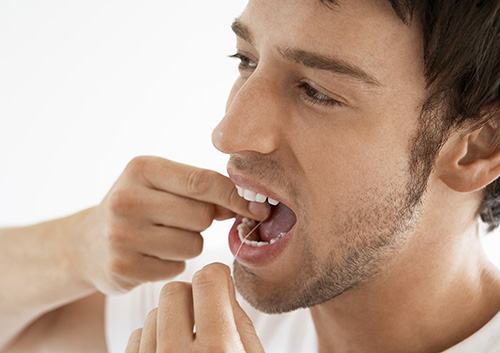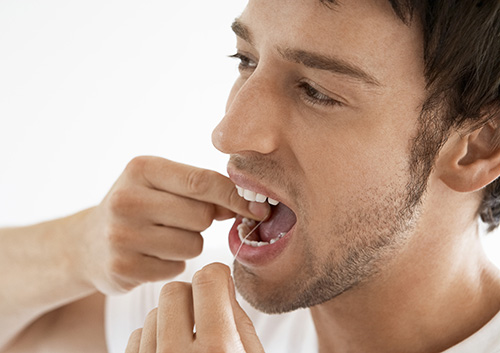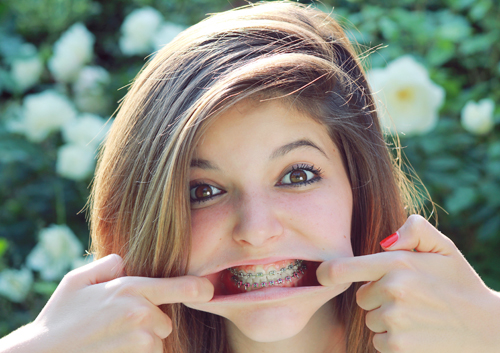July 6th, 2022

By no stretch is it rare for your gums to hurt during and after flossing. Even some bleeding is to be expected. This is especially true if you have not flossed in a long time. However, if your gums do indeed hurt when you floss, and unbearably so, there are some things you can do.
Be Gentle
Perhaps the most obvious way to combat gum soreness and bleeding is to be gentle. One of the most common occurrences of these gum problems is over-aggressive flossing. In other words, if you are too rough on your gums while flossing, either because you are out of practice or because you are in a hurry, soreness and hurting is to be expected. Instead, try taking your time and be gentle. Also, if you are just starting out, be patient and consistent, your gums will become more conditioned over time.
Use an Alternative Method
If being consistent and gentle does not work, there are other alternative methods of flossing that you can try. You can also try a water floss machine, or what is sometimes called a water pick. The device essentially shoots water into the crevasses between your teeth, and in other areas of your mouth, in order to dislodge food and plaque. These oral instruments also come with different attachments that allow you to reach many of the hard to see and reach areas of your mouth. And lastly, you can always buy floss that is not as abrasive to your gums. There is floss that comes with soft and gentle coatings that will do less harm to your gums while they are adjusting to the good oral hygiene habit you are creating.
Flossing is one of the easiest parts of oral hygiene to overlook. When you first start out, it is common that you may want to stop because of the pain it can initially cause. However, if you try one, or all, of the above mentioned methods, you will give yourself the best chance of being success with your flossing, and it won't hurt as much.
For more flossing tips, schedule an appointment at our North York office and askDr. Harry Fung or a member of our team!
July 6th, 2022

By no stretch is it rare for your gums to hurt during and after flossing. Even some bleeding is to be expected. This is especially true if you have not flossed in a long time. However, if your gums do indeed hurt when you floss, and unbearably so, there are some things you can do.
Be Gentle
Perhaps the most obvious way to combat gum soreness and bleeding is to be gentle. One of the most common occurrences of these gum problems is over-aggressive flossing. In other words, if you are too rough on your gums while flossing, either because you are out of practice or because you are in a hurry, soreness and hurting is to be expected. Instead, try taking your time and be gentle. Also, if you are just starting out, be patient and consistent, your gums will become more conditioned over time.
Use an Alternative Method
If being consistent and gentle does not work, there are other alternative methods of flossing that you can try. You can also try a water floss machine, or what is sometimes called a water pick. The device essentially shoots water into the crevasses between your teeth, and in other areas of your mouth, in order to dislodge food and plaque. These oral instruments also come with different attachments that allow you to reach many of the hard to see and reach areas of your mouth. And lastly, you can always buy floss that is not as abrasive to your gums. There is floss that comes with soft and gentle coatings that will do less harm to your gums while they are adjusting to the good oral hygiene habit you are creating.
Flossing is one of the easiest parts of oral hygiene to overlook. When you first start out, it is common that you may want to stop because of the pain it can initially cause. However, if you try one, or all, of the above mentioned methods, you will give yourself the best chance of being success with your flossing, and it won't hurt as much.
For more flossing tips, schedule an appointment at our North York office and askDr. Harry Fung or a member of our team!
June 29th, 2022

The goal of orthodontic treatment at North York Orthodontics, which may include the use of braces, retainers, and aligners, is to straighten your teeth. Treatment often starts in the pre-teen or teenage years, but adults may also need orthodontic treatment. The treatment can feel like a chore that lasts for several months or a couple of years, but it can fix important problems. These include:
- Crowded teeth spaced too close together
- Gaps between your teeth
- Crooked teeth
- Overbite or underbite
- Upper and lower teeth that do not meet
Straight Teeth are More Attractive
You are more likely to be proud of your smile when your teeth are straight and evenly spaced. Pride in your appearance can give you more confidence and encourage you to try new things. This can be particularly important for adolescents. In addition, people often judge others based on first impressions. A smile that shows straight teeth is more attractive.
Better Oral Health is Easier
Brushing and flossing your teeth are two basic components of an oral health routine to protect your teeth from conditions such as tooth decay, gingivitis, and plaque build-up. As Dr. Harry Fung and our staff know, caring for your mouth is easier when your teeth are straight. The Canadian Dental Association says the following conditions are less likely to occur if you have the proper orthodontic treatment.
- Dental caries
- Gum disease or gingivitis
- Tooth loss
- Impaired speech
- Worn tooth enamel
Orthodontic Treatment Improves Nutrition
Poorly aligned teeth can reduce your ability to chew properly or make certain foods more difficult to eat. Many of these more challenging foods are healthy, and avoiding them can cause you to limit your diet to softer, often less-nutritious foods, such as ice cream and canned soup. Straighter teeth and a better ability to chew let you eat crunchy foods, such as apples and carrots; stringy foods, such as asparagus and chicken; and chewy foods, such as raisins.
June 22nd, 2022

You may have noticed that we specialize in orthodontics and dentofacial orthopedics. And while most people we talk to have heard of orthodontics, many are confused by the dentofacial orthopedics part of the title. Today, Dr. Harry Fung and our team thought we would explain the difference.
While orthodontics entails the management of tooth movement, dentofacial orthopedics involves the guidance of facial growth and facial development, which occurs for the most part during childhood, and is a reason why kids are often the best candidates for receiving dentofacial orthopedic therapy. Dr. Harry Fung will examine and monitor your child’s growth to determine when starting treatment will be most effective. If your child begins orthodontic treatment before his or her adult teeth have erupted, it is known as Phase-One treatment. During this phase, Dr. Harry Fung will use treatments designed to correct your child’s jaw growth and make sure that the jaw bone is properly aligned before beginning the next phase of treatment, which usually involves placing braces to straighten your child's teeth.
Dentofacial orthopedics is also used to treat adult patients at North York Orthodontics, however, this process may involve surgery. With our younger patients, we know the jaw bones are still forming, making it easier for our team at North York Orthodontics to control bone growth and tooth movement. Adults, however, are a different story; their bones are no longer growing, and their jaw bones have hardened, so it is more difficult to adjust the bite and move teeth into proper alignment. Dr. Harry Fung may recommend surgery to adjust the jaw bone and establish the proper bite alignment before beginning treatment.
Because our team at North York Orthodontics is skilled in both areas, we are able to diagnose any misalignments in the teeth and jaw as well as the facial structure, and can devise a treatment plan that integrates both orthodontic and dentofacial orthopedic treatments.
We hope that helps! To learn more about dentofacial orthopedics, and to find out if this type of treatment is right for you, please contact our North York office and schedule an initial consultation for you or your child. It’s never too late to get a great smile, and we can’t wait to help you or your child get started.








 Website Powered by Sesame 24-7™
Website Powered by Sesame 24-7™